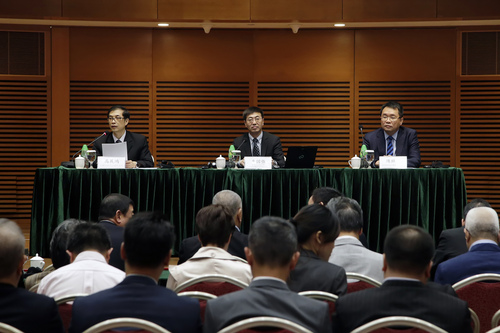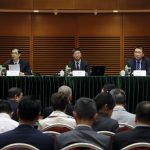 The workshop on the strategy, risk and choices of Macao in the establishment of the 21st Century Maritime Silk Road is held at the Macao Science Centre and attended by more than 200 members of the Election Committee for the fourth term Chief Executive of Macao SAR.
The workshop on the strategy, risk and choices of Macao in the establishment of the 21st Century Maritime Silk Road is held at the Macao Science Centre and attended by more than 200 members of the Election Committee for the fourth term Chief Executive of Macao SAR.
Macao’s ties with China and the Portuguese-speaking countries could be a special feature in the establishment of the Silk Road Economic Belt and the 21st Century Maritime Silk Road (“Belt and Road”). This is according to the Deputy Director of Faculty for Borderland History of the Chinese Academy of Social Science, Mr Li Guoqiang, who spoke today at a workshop on the strategy, risk and choices of Macao in the building of “Belt and Road”. In line with the country’s development blueprint, Macao is positioned as a world centre of tourism and leisure, and a commercial and trade co-operation service platform between China and the Portuguese-speaking countries, as a strategic move for diversifying its economy structure. The work of specifying Macao’s jurisdiction over its customary waters could also bring opportunity in pressing ahead of the development of maritime economy, Li said. The initiative of promoting further integration of Guangdong, Hong Kong, Macao and Taiwan was mentioned in an action plan outlining the country’s strategic vision. Topics were also discussed in the workshop included the direction of “Belt and Road”, the opportunities bring to Macao in regional co-operation, and how to accommodate Macao’s resources in tourist and culture, and the capacity of returned of overseas Chinese under the nation’s strategic development. The workshop, moderated by the Acting Chief-of-Office of the Chief Executive’s Office Mr Kou Chin Hung and the Government Spokesperson Mr Chan Chi Ping, was attended by the Vice Chairman of the Chinese People’s Political Consultative Conference, Mr Ho Hau Wah, the Secretary-General of the Chinese Academy of Social Science Mr Gao Xiang and more than 230 members of the Election Committee for the fourth term Chief Executive of Macao SAR.


